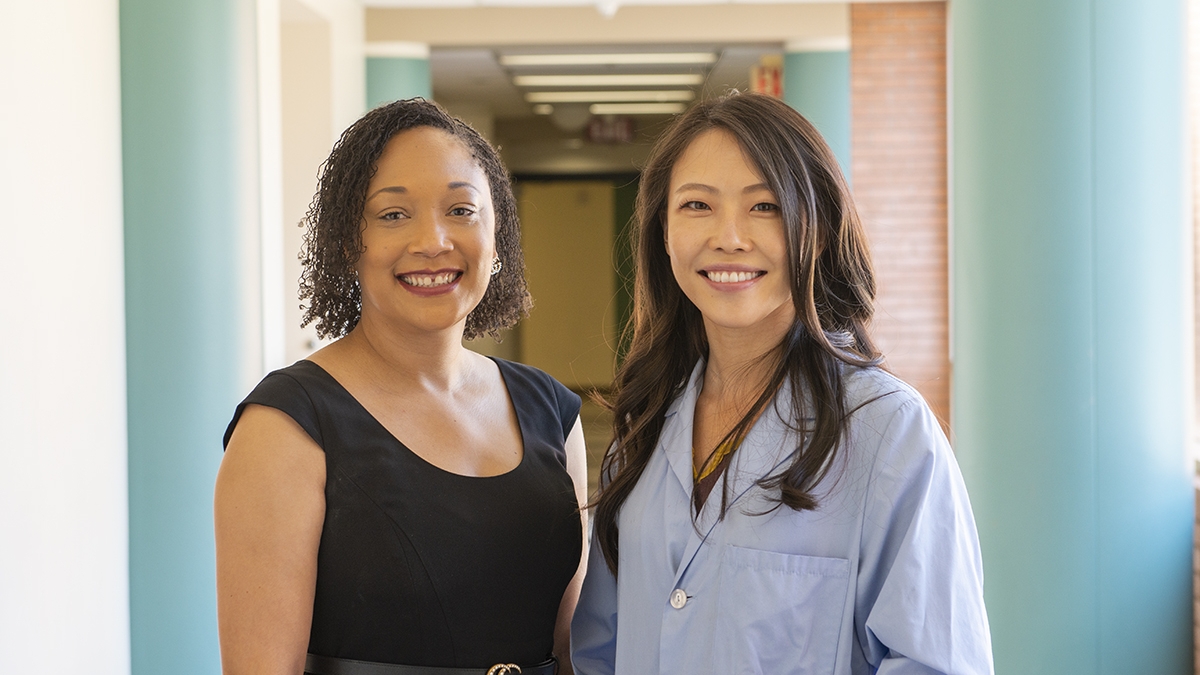2 recent promotions in ASU's School of Molecular Sciences poised to have positive impact on growing number of students

Orenda Griffin (left) and Ara Austin
ASU’s School of Molecular Sciences online degree program continues to enjoy success. Over the past two weeks, over 350 students from the program came to campus to participate in summer laboratory classes, a massive increase from the roughly 40 students who participated in the first summer labs for online students three years ago.
Over the past few years, the online program, which originally consisted of a BS in biochemistry, has expanded to include a BA in chemistry, a BA in biochemistry and a BS in medicinal chemistry. Online School of Molecular Sciences students continue to be successful in attending medical, dental, pharmacy and law schools, as well as a variety of graduate programs and employment opportunities.
The success of the School of Molecular Sciences online program is due, in part, to the leadership of Ara Austin, its manager of online programs. Austin was recently recognized by The College of Liberal Arts and Sciences with this year’s Outstanding Lecturer/Clinical Professor Award. Beginning this summer, Austin will have the opportunity to have a greater impact on students throughout The College as she steps into her new role as the director of online engagement and strategic initiatives. In this position she will work to increase the number of experiential learning opportunities for online students to better prepare them for their careers.
In her position with The College, Austin will increase opportunities for online students to learn and develop professionally through internship and research opportunities. In characteristic fashion, Austin has hit the ground running.
“I am currently working with various faculty members across the natural sciences units to offer research experiences to online students in a more systematic way. I hope that by the end of the first semester, we will have a formal plan set in place.”
As she looks forward to the opportunities ahead, Austin also reflects on her success at the School of Molecular Sciences.
“I will certainly miss all of the (school's) staff and faculty that I have been working with to make our online degree programs grow. I would not have been able to do my job without their help,” Austin said.
In order to continue providing online students with experienced leadership, the School of Molecular Sciences promoted Orenda Griffin to manager of online programs. Griffin has been with the school since 2013, most recently as the assistant director of academic services. In this position she developed the school's advising team to support students and help them achieve their academic goals.
“I’m excited to be part of the continued growth of the (School of Molecular Sciences) degrees available to online students,” Griffin said. “I’m eager to continue to develop additional ways to increase educational access, as well as to increase engagement for our online students as Sun Devils.”
Pierre Herckes, associate director of the School of Molecular Sciences, is pleased Griffin will continue with the school in her new role.
“Orenda is very committed to the success of our students and did an excellent job leading our advising team," he said. "She is very patient, knowledgeable and always looking to find solutions to student issues while also supporting staff and faculty. I am glad that she will stay at (the school) and am looking forward to working with her in her new role as managing director of online programs for the school.”
Drawing from their experience and success, both Griffin and Austin offer advice for their successors.
“Always put the students first and listen to their ideas and concerns,” Austin shared. “I think my successes in managing the online programs have come from working directly with the online students to come up with creative solutions.”
Griffin added, “Connect with advisers, administrators and campus partners across The College and all of ASU to provide the best experience for our students. Remember to show your team how much you appreciate what they do, and have fun! The School of Molecular Sciences has many exceptional students; it is amazing to be a part of such a great place, so enjoy the people around you and the opportunities you have.”
Video courtesy of the School of Molecular Sciences.
More University news

ASU graduates overjoyed — and employed
Adam Wiechman will soon be headed to the Big Apple. Grace Reiter will be pulling up roots in May and moving to Ann Arbor,…

ASU community exceeds goal, raises $835K for Valley of the Sun United Way
The Arizona State University community stepped up and raised over $835,266 for the Valley of the Sun United Way — exceeding the $…

ASU launches online ocean futures undergraduate degrees
Our oceans make up three quarters of the planet’s surface and contain most of its biodiversity. Due to rapid and global changes,…

